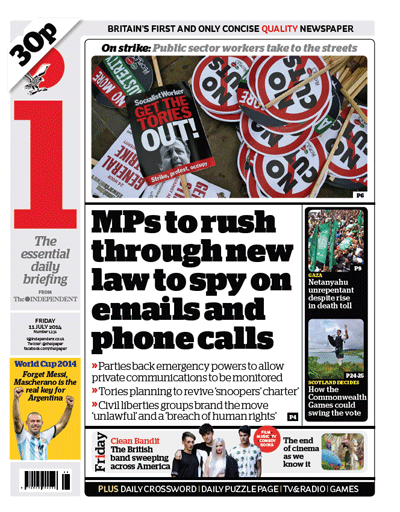Letter from the Political Editor: Phone and data laws to be passed in haste


Your support helps us to tell the story
From reproductive rights to climate change to Big Tech, The Independent is on the ground when the story is developing. Whether it's investigating the financials of Elon Musk's pro-Trump PAC or producing our latest documentary, 'The A Word', which shines a light on the American women fighting for reproductive rights, we know how important it is to parse out the facts from the messaging.
At such a critical moment in US history, we need reporters on the ground. Your donation allows us to keep sending journalists to speak to both sides of the story.
The Independent is trusted by Americans across the entire political spectrum. And unlike many other quality news outlets, we choose not to lock Americans out of our reporting and analysis with paywalls. We believe quality journalism should be available to everyone, paid for by those who can afford it.
Your support makes all the difference.
When politicians act in haste, they often repent at leisure. So they should think very carefully before fast-tracking emergency legislation through Parliament. When that law covers details of our internet use and phone calls, they should be even more cautious.
On the face it, yesterday’s announcement that such a measure will be rammed through the Commons next week with only limited debate looks hard to justify. The law is needed to maintain the existing powers that the police and security services use in criminal and terrorist cases. But it stems from a European Court of Justice ruling in April. Some MPs suspect that negotiations between the three main parties were delayed so there would be no time before Parliament’s summer break for the proper scrutiny such a measure requires.
The hasty law is a holding operation while an important debate takes place. By the time the legislation expires at the end of 2016, independent experts will have carried out a full review of what critics call the “surveillance state”. The politicians will reach a fork in the road.
Conservative ministers hope the review will make the case for even greater surveillance powers, including a record of every website we have visited in the past year. Labour and the Liberal Democrats hope the review will recommend more safeguards to protect our privacy. They will have a dilemma if it supports the “snoopers’ charter” favoured by David Cameron.
The terrorist threat is undoubtedly increasing. Law enforcement agencies must keep pace with the ways criminals communicate. Yet the politicians must take the public with them if the state is to hold even more information about us.
Join our commenting forum
Join thought-provoking conversations, follow other Independent readers and see their replies
Comments